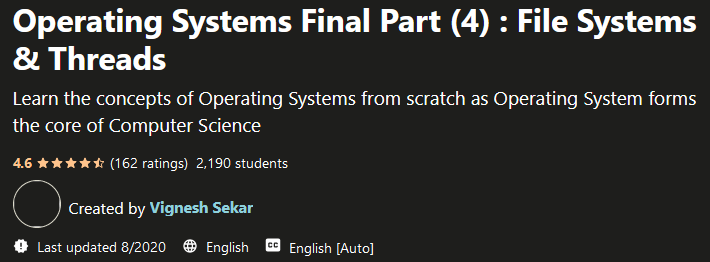Description
Operating systems from scratch , is the name of the video training collection in the field of software and information technology and in the operating system branch. In this educational series, which the publisher has published in two separate parts, you will start learning operating system concepts from the introductory level. The concepts that you will encounter in these two courses include studying and checking various operating system processes. Also, by watching this training course in a specialized way, especially in the second part of this training course, you will master memory management and at the end of this course, you will become an operating system expert.
Also, dear students, you will know how to program the processor as well as the types of algorithms available in operating systems. You will also not need previous knowledge to watch and learn the trainings available in these two courses, and all operating system concepts will be conveyed to you from the beginning in simple language. Also, the course in front of you is for those users who follow computer science and like to understand all the processes in the operating system.
Features of the training course Operating Systems from scratch
- Learning basic and simple operating system concepts in simple and fluent language
- Learning the concepts of operating systems in an advanced way
- Learning how to program the processor in a variety of operating systems
- Learning different programming algorithms used in operating systems
- Learn the memory management strategies used by the operating system
- And…
Specifications of the Operating Systems from scratch course:
- Publisher: Udemy
- Lecturer: Vignesh Sekar
- Level: Introductory to Advanced
- Duration: 08:33:36 / 12:21:54
- Number of courses: 67 / 104
- English language
The headings of the course Operating Systems from scratch
Part 1
Course content
66 lectures 08:21:22
Introduction
2 lectures 02:44
Introduction to Operating Systems
4 lectures 43:28
Operating System Concepts
5 lectures 50:47
CPU Scheduling Algorithms – SJF, SRTF, FCFS
15 lectures 01:54:58
Comparison of FCFS, SJF and SRTF – Advantages and Disadvantages
4 lectures 41:30
CPU Scheduling Algorithms – LJF, LRTF, Priority-based, HRRN
21 lectures 02:06:46
Basics of Number System
2 lectures 13:46
Memory Allocation Techniques
12 lectures 01:46:40
How to proceed further
1 lecture 00:56
Part 2
Course content
104 lectures 12:21:54
Introduction
2 lectures 07:55
Basics of Memory Management (Cover it only if you have not watched part 1)
13 lectures 01:48:33
Paging
11 lectures 01:36:36
Problems on paging
6 lectures 29:58
Multilevel Paging
6 lectures 51:34
Multilevel Paging Problems
10 lectures 01:36:35
Page Table Entry
6 lectures 29:41
Page Table Entry Problems
5 lectures 32:36
Virtual Memory
2 lectures 18:08
Average Memory Access Time (AMAT)
5 lectures 34:07
Translation Lookaside Buffer (TLB)
6 lectures 39:38
Problems on TLB
4 lectures 18:26
Frame Allocation
7 lectures 56:08
Page Replacement Algorithms
16 lectures 01:31:48
Advanced Problems on Page Replacement Algorithms
4 lectures 29:46
What next
1 lecture 00:30
Part 4
Required conditions
Part 1
- Have a PC with internet connection
- Even ZERO knowledge in Operating Systems is fine – I’ll teach you everything you need to know
Part 2
- Have a PC with internet connection
- Should have watched my Operating Systems from Scratch – Part 1 course (or) You should already be aware with basics of operating
- systems, computers
Part 3
-
Have a PC with internet connection
-
Basics of Operating systems is necessary – if you have watched my Operating Systems Part 1 course you are good to start this course
Part 4
- Basics of Operating systems is necessary – if you have watched my Operating Systems Part 1 and Part 2 courses you are good to start this course
- Have a PC with internet connection
Images of Operating Systems from scratch




Sample video of Operating Systems from scratch
Installation guide
After extracting, watch with your favorite player.
download link
Password file(s): www.downloadly.ir
Size
First part: 6.66 GB
Second part: 16.6 GB
The third part: 18.9 GB
Fourth section: 13.3 GB